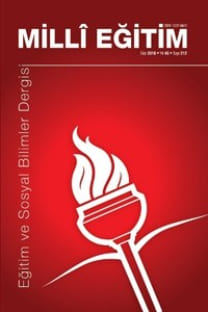SU DALGALARI KONUSUNUN ÖĞRETİMİNDE İŞBİRLİKLİ ÖĞRENME YÖNTEMİNİN ÖĞRENCİ BAŞARISINA ETKİSİ
Bu araştırma ile ortaöğretim düzeyinde, su dalgaları konusunun öğrenimine yönelik etkinlikler geliştirilmesi ve bu etkinliklerin kullanıldığı işbirlikliöğrenme yönteminin öğrencilerin konuya yönelik başarı ile öğrencilerin öğretimyöntemine yönelik görüşleri üzerindeki etkilerinin geleneksel öğretiminkilerlekarşılaştırılması amaçlanmıştır.Araştırma 2007-2008 öğretim yılında bir devlet lisesinin son sınıfındaokuyan ve sayısal alanı seçen öğrenciler ile yapılmıştır. Araştırma ön ölçüm veson ölçüm uygulanarak, 22 kişilik deney ve 18 kişilik kontrol grubu üzerindeyürütülmüştür.Denel işlemler süresince deney grubunda işbirlikli öğrenme teknikleriyle birlikte, etkili öğrenme işlerine göre hazırlanan su dalgaları konusunayönelik etkinliklerle; kontrol grubunda ise, geleneksel öğretim yöntemleriyleders işlenmiştir. Denel işlemler öncesi ve sonrasında her iki gruba başarı ölçeğiuygulanmıştır. Ayrıca, uygulamanın bitiminde her iki gruptaki öğrencilere kullanılan yöntemlere yönelik görüşleri kompozisyon biçiminde yazdırılmıştır. Araştırmanın sonucunda; işbirlikli öğrenme ve geleneksel öğretim sınıfı öğrencileri arasında akademik başarıları arasında deney grubu yönündeolumlu fark olduğu bulunmuştur.Ayrıca öğrenciler tarafından yazılan kompozisyonlardan; işbirlikliöğrenmenin, öğrencilerin birtakım sosyal becerilerini kullanmalarını ve geliştirmelerini sağladığı, bilgi paylaşımı sayesinde konuyu daha iyi öğrenmelerineyardımcı olduğuna yönelik etkilerinin olduğu ortaya konulmuştur
By this research, it was intended to develop some activities related to instructing water waves at the level of secondary school, and to compare effects of the cooperative learning method, in which these activities were used on students’ achievement and views towards actual teaching methods, with conventional teaching methods. The research was performed on the forth grade students who go to a state school in 2007-2008 academic year. The research was conducted by a total of 40 students, 22 of them is named as experimental group whereas 18 of them is named as control group. During the experimental processes, together with cooperative learning techniques, according to learning tasks activities relating water waves prepared were applied on the experimental group, whereas traditional teaching techniques were applied on the control group students. Before and after the experimental processes; achievement tests were applied on both groups. Moreover, at the end of the experimental processes, the students in both groups were asked to write down their ideas in composition towards the methods used during the lessons. At the end of research, it was found that there were some significant differences in favour of experimental group on the achievement. Moreover, it was revealed from the compositions, written down by the students, that the cooperative learning provided the students to use and develop some certain social skills, and help them to learn in a better way by sharing information.
